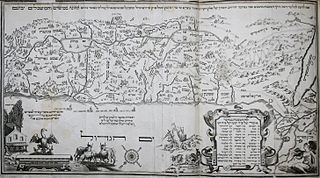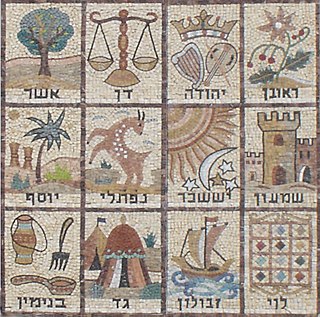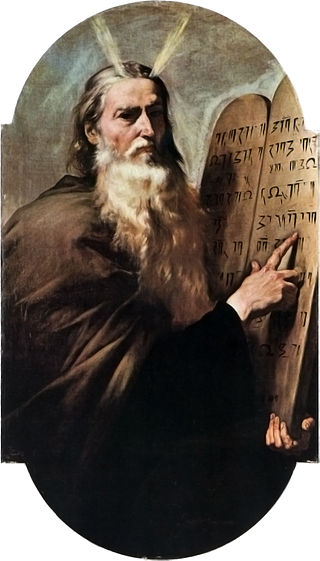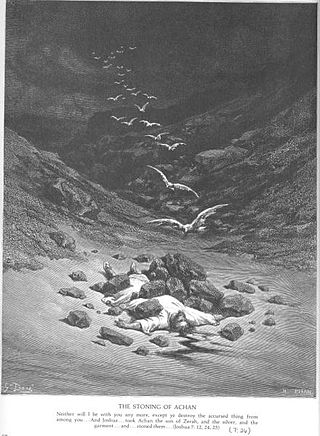A pious fiction is a narrative that is presented as true by the author, but is considered by others to be fictional albeit produced with an altruistic motivation. The term is sometimes used pejoratively to suggest that the author of the narrative was deliberately misleading readers for selfish or deceitful reasons. The term is often used in religious contexts, sometimes referring to passages in religious texts.
{{cite news}}: CS1 maint: numeric names: authors list (link)
The Bible is a collection of religious texts or scriptures which to a certain degree are held to be sacred in Christianity, Judaism, Samaritanism, Islam, the Baháʼí Faith, and other Abrahamic religions. The Bible is an anthology originally written in Hebrew, Aramaic, and Koine Greek. The texts include instructions, stories, poetry, prophecies, and other genres. The collection of materials that are accepted as part of the Bible by a particular religious tradition or community is called a biblical canon. Believers in the Bible generally consider it to be a product of divine inspiration, but the way they understand what that means and interpret the text varies.
The Old Testament (OT) is the first division of the Christian biblical canon, which is based primarily upon the 24 books of the Hebrew Bible, or Tanakh, a collection of ancient religious Hebrew and occasionally Aramaic writings by the Israelites. The second division of Christian Bibles is the New Testament, written in Koine Greek.

The Torah is the compilation of the first five books of the Hebrew Bible, namely the books of Genesis, Exodus, Leviticus, Numbers and Deuteronomy. In Christianity, the Torah is also known as the Pentateuch or the Five Books of Moses. In Rabbinical Jewish tradition it is also known as the Written Torah. If meant for liturgic purposes, it takes the form of a Torah scroll. If in bound book form, it is called Chumash, and is usually printed with the rabbinic commentaries.
The Nevi'im is the second major division of the Hebrew Bible, lying between the Torah and Ketuvim. The Nevi'im are divided into two groups. The Former Prophets consists of the narrative books of Joshua, Judges, Samuel and Kings; while the Latter Prophets include the books of Isaiah, Jeremiah, Ezekiel, and the Twelve Minor Prophets.

According to the Hebrew Bible, the tribe of Judah was one of the twelve Tribes of Israel, named after Judah, the son of Jacob. Judah was the first tribe to take its place in the Land of Israel, occupying its Southern part. Jesse and his sons, including King David, belonged to this tribe.

According to the Hebrew Bible, the Tribe of Ephraim was one of the tribes of Israel. The Tribe of Manasseh together with Ephraim formed the House of Joseph. It is one of the ten lost tribes. The etymology of the name is disputed.

According to the Hebrew Bible, the Tribe of Manasseh was one of the twelve tribes of Israel. After the catastrophic Assyrian invasion of 720 BCE, it is counted as one of the ten lost tribes. Together with the Tribe of Ephraim, Manasseh also formed the House of Joseph.
This article distinguishes the various terms used to describe Jewish and Christian scripture. Several terms refer to the same material, although sometimes rearranged.
The historicity of the Bible is the question of the Bible's relationship to history—covering not just the Bible's acceptability as history but also the ability to understand the literary forms of biblical narrative. Questions on biblical historicity are typically separated into evaluations of whether the Old Testament and Hebrew Bible accurately record the history of ancient Israel and Judah and the second Temple period, and whether the Christian New Testament is an accurate record of the historical Jesus and of the Apostolic Age. This tends to vary depending upon the opinion of the scholar.
A Hebrew name is a name of Hebrew origin. In a more narrow meaning, it is a name used by Jews only in a religious context and different from an individual's secular name for everyday use.

The Law of Moses, also called the Mosaic Law, is the law said to have been revealed to Moses by God. The term primarily refers to the Torah or the first five books of the Hebrew Bible.

The Twelve Tribes of Israel are, according to Hebrew scriptures, the descendants of the biblical patriarch Jacob, who collectively form the Israelite nation. The tribes were through his twelve sons through his wives, Leah and Rachel, and his concubines, Bilhah and Zilpah. In modern scholarship, there is skepticism as to whether there ever were twelve Israelite tribes, with the use of the number 12 thought more likely to signify a symbolic tradition as part of a national founding myth, although some scholars disagree with this view.
Criticism of the Bible refers to a variety of criticisms of the Bible, the collection of religious texts held to be sacred by Christianity, Judaism, Samaritanism, and other Abrahamic religions. Criticisms of the Bible often concern the text’s factual accuracy, moral tenability, and supposed inerrancy claimed by biblical literalists. There remain questions of biblical authorship and what material to include in the biblical canon.

Mosaic authorship is the Judeo-Christian tradition that the Torah, the first five books of the Hebrew Bible/Old Testament, were dictated by God to Moses. The tradition probably began with the legalistic code of the Book of Deuteronomy and was then gradually extended until Moses, as the central character, came to be regarded not just as the mediator of law but as author of both laws and narrative.
The term Bible fiction refers to works of fiction which use characters, settings and events taken from the Bible. The degree of fictionalization in these works varies and, although they are often written by Christians or Jews, this is not always the case.

Herem or cherem, as used in the Tanakh, means something given over to the Lord, or under a ban, and sometimes refers to things or persons to be utterly destroyed. The term has been explained in different and sometimes conflicting ways by different scholars. It has been defined as "a mode of secluding, and rendering harmless, anything imperilling the religious life of the nation", or "the total destruction of the enemy and his goods at the conclusion of a campaign", or "uncompromising consecration of property and dedication of the property to God without possibility of recall or redemption". It is translated into Latin as devotio, a word used for human sacrifice, and into Greek as anathema, which was a sacrifice to the gods.

According to the Hebrew Bible, the Tribe of Simeon was one of the twelve tribes of Israel. The Book of Joshua locates its territory inside the boundaries of the Tribe of Judah. It is usually counted as one of the ten lost tribes, but as its territory was south of Judah and gradually being absorbed by Judah, it cannot be considered one of the tribes of the Kingdom of Israel and would certainly not have been affected by the Assyrian sack of the kingdom.

According to the Torah, the Tribe of Benjamin was one of the Twelve Tribes of Israel. The tribe was descended from Benjamin, the youngest son of the patriarch Jacob and his wife Rachel. In the Samaritan Pentateuch the name appears as Binyamēm.

According to the Hebrew Bible, the Tribe of Asher was one of the Tribes of Israel descended from Asher, the eighth son of Jacob. It is one of the ten lost tribes.

The Tribe of Naphtali was one of the northernmost of the twelve tribes of Israel. It is one of the ten lost tribes.